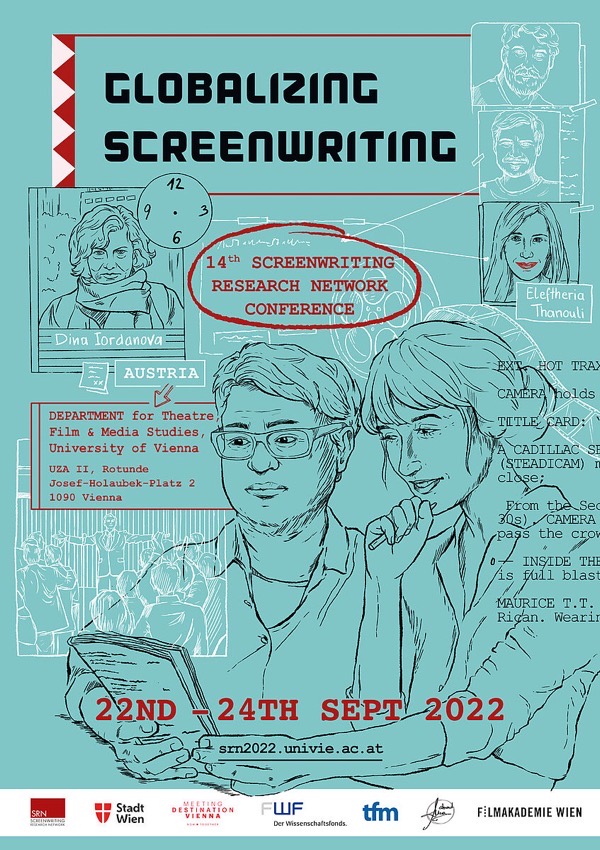Transcript:
I think the first binging I ever did. I didn’t think I’d be a fan of that because I’m fine with weekly making an appointment to see a show, but, again, I mentioned I’ma huge Doctor Who fan. I’ve written some chapters in Doctor Who books, too. In fact, There’s a new one coming out. I got to write about Jodie Whittaker’s first two years as the female Doctor and I loved that, but when Doctor Who had a spin-off called “Torchwood” and its third season was only five episodes and it was one whole arc story and I started to watch that one night at 8, 9 o’clock and thought I’d just watch a couple. I know it’s five episodes. I’m not going to binge the thing and after the second one, I was up until three in the morning. I had to see how it ended. Russell Davies. One of my favorite writers in the UK.
One of the benefits of attending conferences is that you can meet the editors from the companies that have published some of your books face to face. That happened at the recent SCMS conference where I met Intellect editor James Campbell and he invited me to be a guest on his InstagramLive show.
We chatted about my work with the Stephens College MFA in TV and Screenwriting, and then my work with co-editor Rose Ferrell on the Journal of Screenwriting’s special issue on Women in Screenwriting (Volume 11, Number 3) that came out recently and which featured articles about an international set of female screenwriters from Syria, Argentina, China and Canada (to name a few).
We even had time to nerd out on our own favorite classic films across the eras which brought up fun memories of Angels with Dirty Faces, Back to the Future, Bonnie and Clyde, and of course, all things Star Wars from the original 3 to The Mandalorian. It’s always so fun to talk to fellow cinephiles.

Watch this entire presentation
With Intellect Books Editor James Campbell (@IntellectBooks)
Speaking with Dr. Rosanne Welch, Author, teacher, and television screenwriter. Today we cover everything from women in screenwriting to our favorite Jimmy Cagney movies and Friends.
Podcast: Play in new window | Download
Subscribe: RSS
![32 Binging TV with Torchwood from In Conversation with Dr. Rosanne Welch [Video]](https://rosannewelch.com/wp-content/uploads/2022/10/rmw-intellect-32.jpg)

![Rosanne Presenting at San Diego Who Con via Instagram [Photography]](https://rosannewelch.com/wp-content/uploads/2022/10/2022-10-22-14.13.26-1.jpg)
![03 Jeanne Macpherson & Suso Cecchi d'Amico From Jeanne to Suso to Julie to Spike: How Jeanne Macpherson’s Manual on Screenwriting Influenced Italian Realism which Influenced Black Independent Film in the U.S. [Video]](https://rosannewelch.com/wp-content/uploads/2022/10/rmw-srn-vienna-2022-03.jpg)


![Presenting at San Diego Who Con via Instagram [Photography]](https://rosannewelch.com/wp-content/uploads/2022/10/2022-10-22-14.20.48-1.jpg)
![Ready to present at San Diego Who Con via Instagram [Photography]](https://rosannewelch.com/wp-content/uploads/2022/10/2022-10-22-13.41.12.jpg)
![15 We Quote Dialogue, Not Camera Moves from What Is a Western? Interview Series: When Women Wrote Westerns from the Autry Museum of the American West [Video]](https://rosannewelch.com/wp-content/uploads/2022/10/rmw-western-15.jpg)
![31 Mystic Popup Bar and Binging TV from In Conversation with Dr. Rosanne Welch [Video]](https://rosannewelch.com/wp-content/uploads/2022/10/rmw-intellect-31.jpg)
![02 Who was JeanneMacpherson? From Jeanne to Suso to Julie to Spike: How Jeanne Macpherson’s Manual on Screenwriting Influenced Italian Realism which Influenced Black Independent Film in the U.S. [Video]](https://rosannewelch.com/wp-content/uploads/2022/10/rmw-srn-vienna-2022-02.jpg)
![14 More On Writer Vs. Director from What Is a Western? Interview Series: When Women Wrote Westerns from the Autry Museum of the American West [Video]](https://rosannewelch.com/wp-content/uploads/2022/10/rmw-western-14.jpg)
![30 More On International Opportunities from In Conversation with Dr. Rosanne Welch [Video]](https://rosannewelch.com/wp-content/uploads/2022/10/rmw-intellect-30.jpg)